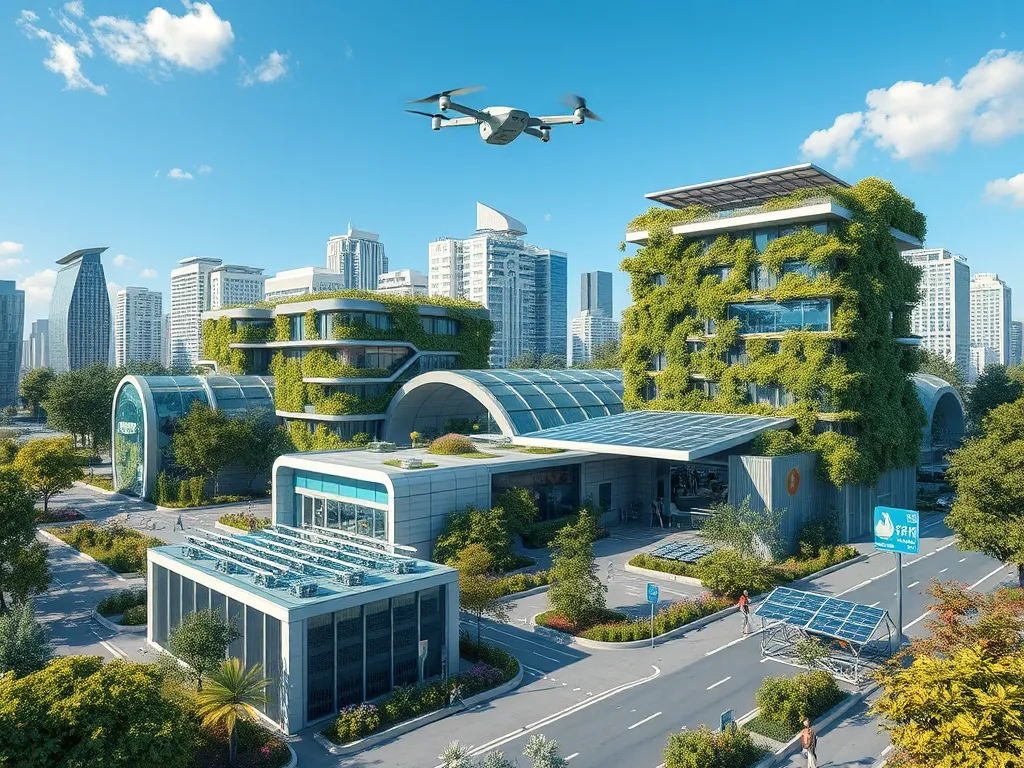Envisioning Future Waste Management: Sustainable Solutions

Future Waste Management: Innovations and Sustainable Practices
The future of waste management is an evolving landscape characterized by technological advancements, sustainable practices, and a commitment to reducing environmental impact. With the world's population steadily increasing and urban areas expanding, the challenge of waste disposal has become more pressing than ever. Innovative strategies and a shift towards sustainable practices are paramount in forging a path for more efficient waste management systems in the future.
In the realm of future waste management, technological innovations play a pivotal role in optimizing waste collection, sorting, and processing. IoT-enabled smart bins, advanced recycling techniques, and AI-assisted sorting systems are just a few examples of how technology can streamline operations. As cities globally strive to manage waste more effectively, these innovations promise to enhance efficiency while reducing costs and environmental footprints.
Beyond technological advancements, sustainable practices form the backbone of future waste management strategies. Concepts such as zero waste initiatives, circular economies, and community engagement drive the reduction of waste at its source. By promoting responsible consumption and utilizing resources more effectively, we can create a circular system where waste is minimized and materials are reused, ultimately leading to a reduction in landfill burden and pollution.
Furthermore, regulatory frameworks for future waste management are essential in driving systemic change. Governments and organizations are increasingly developing policies that promote sustainable waste management practices, international standards, and extended producer responsibility (EPR) initiatives. These frameworks aim to hold producers accountable for their products throughout their lifecycle and incentivize waste reduction, fostering a culture of sustainability that transcends individual actions.
Education and public awareness also play a critical role in shaping future waste management. Engaging citizens through campaigns on recycling and waste reduction, as well as educational programs in schools and community workshops, raises consciousness around waste issues. Social media serves as a powerful platform to disseminate information and mobilize local communities for collective action, paving the way for a more informed and proactive citizenry.
Technological Innovations in Waste Management
Smart bins equipped with sensors can monitor waste levels and send notifications for collection, optimizing routes for waste collection trucks. This IoT technology significantly reduces fuel consumption and operational costs while minimizing the carbon footprint associated with waste collection efforts. With real-time data, waste management authorities can make informed decisions and respond swiftly to changing waste patterns.
As cities strive for sustainability, innovative practices highlight that The Future of Waste is No Waste is not just possible, but imperative.
Advanced recycling technologies, such as chemical recycling, allow for the repurposing of materials that traditional recycling methods cannot process. These innovations can break down plastics into their basic components, which can be reused to create new products. This not only diverts waste from landfills but also reduces the dependency on virgin materials, promoting a more sustainable circular economy.
AI and machine learning are revolutionizing waste sorting processes. By utilizing sophisticated algorithms and computer vision, machines can identify and sort different types of waste from recyclables. This not only increases the efficiency of sorting facilities but also enhances recycling rates by minimizing human error, ensuring that more materials are reintegrated into the supply chain.
Waste-to-energy technologies convert non-recyclable waste materials into usable energy, significantly reducing landfill volumes. These systems capture methane released from organic waste and convert it into electricity, providing a dual benefit of waste reduction and energy production. As the technology matures, waste-to-energy solutions can serve as valuable components of a comprehensive waste management strategy.
Blockchain technology is emerging as a tool for improving waste tracking and management efficiency. By providing a transparent and immutable record of waste transactions, blockchain can enhance accountability for all parties involved in the waste management process. This could lead to better compliance with regulations and greater trust between consumers and producers in how waste is handled and processed.
Sustainable Practices in Waste Reduction
Zero waste initiatives focus on redesigning resource life cycles so that all products are reused. This philosophy encourages individuals and organizations to rethink their consumption habits, minimizing waste at its source. Communities that adopt these initiatives often see significant reductions in the amount of waste sent to landfills, fostering a culture of sustainability.
Composting and organic waste management are vital components of sustainable waste practices. By diverting organic materials from landfills, composting not only reduces greenhouse gas emissions but also creates rich soil that can be used for agriculture and gardening. Community composting programs are increasingly being adopted to educate the public and promote environmentally friendly waste disposal methods.
Circular economy concepts seek to create closed-loop systems where waste is minimized, and resources are reused. By designing products for longevity and reparability, manufacturers can contribute to the reduction of waste, thus promoting a sustainable consumption model. The transition from a linear economy (take-make-dispose) to a circular one is integral for future waste management.
Waste minimization strategies involve assessing and altering production processes to lessen the generation of waste. Businesses can adopt strategies like lean manufacturing and eco-design to optimize resource use and reduce reject rates, thereby contributing to sustainable waste management. Educating businesses on these practices is crucial for systemic change.
Community engagement in waste reduction initiatives is essential for fostering a culture of sustainability. Local forums and workshops can actively involve citizens in waste management discussions and decision-making processes. By empowering communities, we enhance ownership over waste management practices and encourage proactive participation.
Regulatory Frameworks for Future Waste Management
Policies that promote sustainable waste management are increasingly crucial in addressing the challenges posed by rapid urbanization and consumption. Governments worldwide are adopting regulations that encourage waste reduction, recycling, and responsible disposal to drive systemic change in waste management practices. Legislative measures will shape the landscape of future waste systems, ensuring sustainability is at the forefront.
International waste management standards are developing to create a cohesive framework that governs waste practices globally. These standards provide benchmarks for countries to aspire to, fostering collaboration across borders to tackle common waste issues. As nations adopt and align with these standards, we can collectively enhance waste management efforts and promote sustainability.
Extended producer responsibility (EPR) policies hold manufacturers liable for the entire lifecycle of their products, including end-of-life waste management. Implementing EPR ensures that producers take responsibility for packaging waste and encourages reuse and recycling initiatives. By incentivizing responsible production, EPR policies can lead to significant reductions in waste generation.
Incentives for waste reduction can take many forms, including tax breaks for companies that adopt sustainable practices or grants for communities implementing innovative waste management solutions. Financial incentives catalyze change, allowing various sectors to invest in sustainable technologies and practices that benefit the environment.
Regulations can spur innovation in waste management by setting standards that require new technologies and methods. This push can lead to increased investment in research and development, driving advancements that improve efficiency and sustainability in the waste management sector. The intersection of policy and innovation is critical in shaping the future of waste management.
Public Awareness and Education in Waste Management
Campaigns for waste sorting and recycling play a pivotal role in educating citizens about their waste responsibilities. Comprehensive awareness campaigns can inform individuals about proper waste disposal methods, aiming to eradicate common misconceptions around recycling and waste management. These initiatives increase participation in sustainable practices across communities.
Educational programs in schools targeting students from a young age can instill values of sustainability and environmental stewardship. Integrating lessons on waste management into school curricula encourages the next generation to adopt responsible waste practices and serves to create informed citizens who are proactive about sustainability.
Community workshops focused on waste reduction provide hands-on experiences and practical tips for individuals to manage their waste effectively. These events foster community resilience and engagement, encouraging citizens to collaborate toward common goals in waste management and sustainability initiatives.
The role of social media in raising awareness about waste management cannot be understated. Platforms like Instagram, Twitter, and TikTok provide cost-effective ways to reach large audiences, promoting campaigns and initiatives aimed at reducing waste. Influencers and activists utilize these channels to engage and inspire their followers to adopt more sustainable practices.
Engaging local communities in waste management efforts ensures that solutions are tailored to specific needs and involve input from residents. Collaborating with community leaders and influencers builds trust and encourages collective action toward more sustainable waste management practices, leading to better outcomes overall.
Challenges in Implementing Future Waste Management Solutions
Financial constraints and funding issues pose significant challenges for cities and organizations aiming to implement innovative waste management solutions. Securing investment for new technologies and infrastructure can be daunting, often leading to reliance on outdated systems that do not meet current sustainability goals.
Technological barriers in developing regions limit the adoption of advanced waste management practices. Insufficient infrastructure, lack of access to technology, and limited training impede progress, requiring targeted solutions that address these unique challenges while ensuring equity in waste management.
Public resistance to new practices, particularly changes in consumption habits, can be a substantial obstacle in implementing sustainable waste management solutions. Addressing concerns and effectively communicating the benefits of new initiatives are critical to fostering acceptance and participation among the public.
Environmental impacts associated with current waste management systems, such as pollution and greenhouse gas emissions, are pressing challenges that exacerbate climate change. Transitioning to more sustainable practices requires a wholesale rethink of existing systems to mitigate these impacts effectively.
The role of global cooperation is crucial in overcoming challenges in future waste management. Countries must work together, sharing best practices, technology, and resources to tackle waste issues that transcend borders. International collaboration fosters a holistic approach to waste management that can lead to more sustainable outcomes for the planet.
